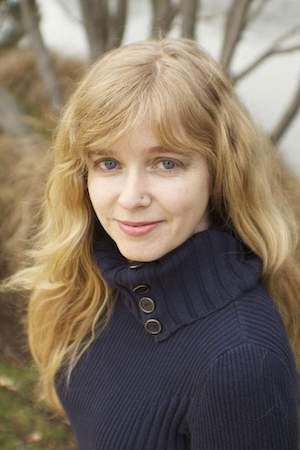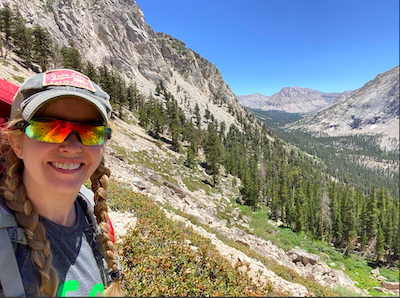
Alumni Spotlight: Caitlin Crum
 “Psychology has intrigued me since childhood, and I’ve always been curious to look at people’s identities, interpersonal relatedness, and the challenges that we experience from multiple vantage points,” shared Caitlin Crum, who graduated from the Wright Institute’s Counseling Psychology Program in 2010.
“Psychology has intrigued me since childhood, and I’ve always been curious to look at people’s identities, interpersonal relatedness, and the challenges that we experience from multiple vantage points,” shared Caitlin Crum, who graduated from the Wright Institute’s Counseling Psychology Program in 2010.
Caiti was born in New York and grew up in southeastern Wisconsin. “We lived in a rural community and I spent a lot of time running around outside,” she recalled. “We didn’t have any neighbors close by and I had miles of beach and woods to explore.” Caiti was an only child, but developed very close friendships in her childhood with people she now considers her “chosen siblings.” From first through twelfth grade, she attended a rigorous college preparatory school. “The autonomy I developed early on and deep trust and connection with the earth around me were foundational to informing my values and identity,” she shared.
For her undergraduate studies, Caiti attended Kenyon College and got her BA in Visual Arts. Her emphasis within visual arts was on video art and installation, but she also enjoyed studying creative writing and anthropology during her time there. “Kenyon taught me the importance of finding new ways of collaborating and trusting the resilience of enduring friendship,” she reflected. “Much of who I am and what I do now is nourished by the people and education I connected with at Kenyon. I feel that the education and life that started at Kenyon have allowed me to make rewarding, creative risks with life and career choices.” Caiti was awarded Kenyon’s Alumni Humanitarian Award last year along with three friends from her undergraduate years for their combined effort to provide support for healthcare workers during the COVID-19 pandemic.
After graduating from Kenyon, Caiti spent several years teaching middle and high school students, which led to her interest in pursuing psychology as a career. A friend encouraged her to apply to the Wright Institute’s Counseling Psychology Program as she contemplated the next steps on her professional path. “I was immediately drawn to the mission and felt my interests and motivations would be brought together through my experience with this program,” she shared. Caiti was particularly drawn to the Wright Institute’s focus on connecting students with one another and with the tools and resources they need to help others.
“I have so many happy memories from my time as a student at the Wright,” Caiti recalled. She was a member of the third class of students to participate in the Counseling Psychology Program and she connected deeply with members of her cohort. “Enjoying the exilic space that the cohort and, in my experience, the weekend intensive model offered, and seeing my colleagues absorb the professor’s teaching, metabolize and forge a conclusion that I knew would be shared through their work with many people was so powerful and inspiring,” she reflected. “The knowledge that everything incubating in that classroom space would impact so many people continues to bring me joy.” Members of her cohort were there to support her through the highs and lows of the program, forging bonds that still hold strong today.
Looking back on her time in the Wright Institute’s Counseling Psychology Program, Caiti shared that the most valuable lesson she learned was to trust herself and her intuition. “Graduate school allowed me a place and opportunity to evolve in a way that I don’t think another field or space would have afforded me,” she shared. Another lesson that Caiti still carries with her is that "being a therapist requires you to hold a canvas in front of you, allowing people to paint what they will onto that canvas, without painting you directly.” These wise words were shared with her by her practicum supervisor, Sandra Stevenson, at St. Mary’s Hospital in San Francisco. “This description of holding boundaries within the therapeutic space while maintaining authenticity provides sustainability in the role,” she reflected. “It allows me to balance the role of bearing witness to everything brought into session in a compassionate but boundaried manner."
“The Counseling Psychology Program at the Wright took my values alongside my curiosity and galvanized both into an empowered array of tools I rely on to govern my strategy and attitude toward my career,” Caiti shared. “I couldn’t have gotten to the work I do now without the qualities that make the experience at the Wright unique.” Thinking back on her own experience at the Wright, Caiti encourages current or prospective students to trust the process. “By connecting with the material in each course, taking the time to reflect on your life, challenge your perspectives, and contemplating how to apply this to your next steps toward your license, you can connect with the material in a way that allows for the coursework and your time at the Wright to have tremendous longevity,” she reflected. Caiti also reminds students that part of what makes a great therapist is the ability to identify how and when they apply their own values onto their clients instead of taking the time to learn the clients’ governing principles and incorporate those into the work.
In 2013, Caiti established her own small private practice. When describing her approach on her website, she states: “You are your own expert and I am here to support healing and foster development.” Caiti explained this statement by sharing that she tries to “empower clients to gain trust and confidence in themselves.” In her private practice, Caiti specialized in grief and bereavement support, trauma resolution, anxiety, and depression. Although she no longer works with clients in private practice, she found it to be very grounding work alongside her more administrative roles.
Caiti earned a certification in Thanatology from the Association of Death Education and Credentialing in 2019. Although her initial goal wasn’t to specialize in the study of death, dying, and bereavement, she was led to this area of focus as a result of her internship at Hope Hospice in Dublin. In that position, she worked with clients who had recently experienced a loss at a grief support center. “The work was transformative, and I knew that whatever I did after, I would incorporate grief work in some capacity,” she recalled. Caiti had experienced the loss of friends and loved ones in her own life and the program at ADEC provided her with the practical information she needed to process her own grief and support others.
In her current role as the VP of Therapy at Foresight Mental Health,Caiti leads a department of therapists across seven states with the mission of providing access to high-quality mental healthcare. This was a significant change from her previous roles working in community behavioral health in Alameda County. “I have the good fortune of applying what I’ve learned and experienced to the vision and practice in a broad capacity,” she reflected. “This change involved risk with stepping into a completely different area of mental healthcare, and I’m grateful for the experience.”
Recently, Caiti returned to the Wright Institute’s Counseling Psychology Program as an adjunct professor, teaching the Aging and Long Term Care course. She had always wanted to teach at the graduate level, so jumped at the opportunity when it arose. “I love teaching ALTC because I’m very passionate about the subject matter and it’s a beautiful opportunity to engage students in what has been a historically underrepresented subject in mental healthcare,” she shared.
 In her free time, Caiti enjoys spending quality time with her son, partner, friends, and family members. She loves exploring “the beautiful, remote locations California offers, backpacking and camping whenever possible.”
In her free time, Caiti enjoys spending quality time with her son, partner, friends, and family members. She loves exploring “the beautiful, remote locations California offers, backpacking and camping whenever possible.”
Looking forward, it’s clear that there are big achievements in Caiti’s future. She is currently working on her Ph.D. in Anthropology and Social Change at California Institute of Integral Studies while continuing her research on transnational migration, remittances, and the globalization of healthcare. “In addition to continuing along a path of leadership in mental healthcare, I intend to incorporate research on the subject of the social implications for globalized healthcare into public dialogue,” she shared. “I’m interested in examining concepts such as help and altruism from the dynamic, intersecting perspectives that anthropology affords.”
